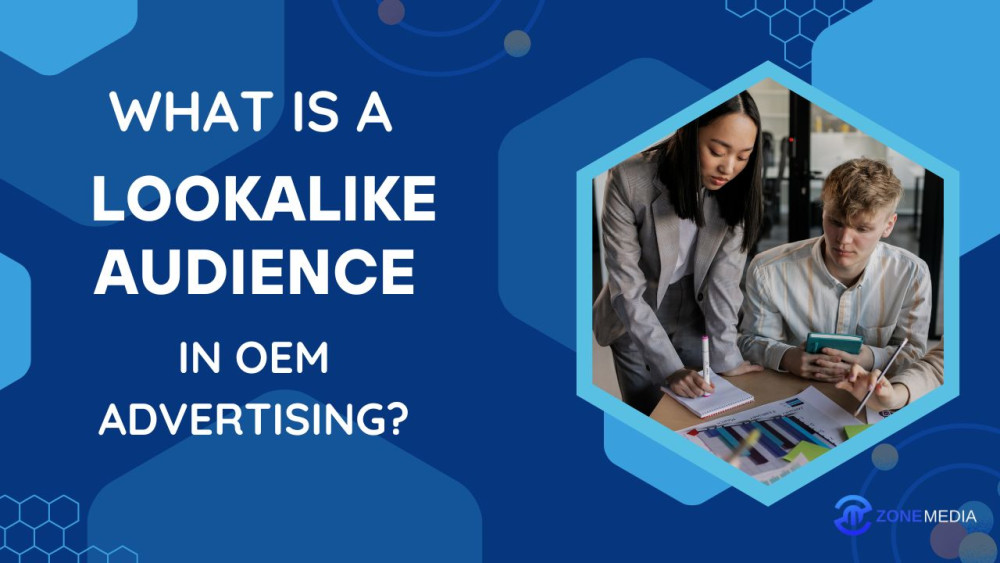Introduction: Unlocking the Power of Lookalike Audiences in OEM Advertising
In the competitive world of Original Equipment Manufacturer (OEM) advertising, reaching the right audience is crucial for maximizing return on investment (ROI). But what if you could find new customers who behave just like your most valuable existing customers? That’s where Lookalike Audiences come into play.
Lookalike Audiences use AI-powered data analysis to identify and target individuals who share characteristics with your best-performing customers. This method allows OEMs to expand their reach, improve engagement, and drive higher conversions with precision targeting.
1. What is a Lookalike Audience?
A Lookalike Audience is a group of potential customers who resemble your existing customer base in terms of demographics, behavior, and interests. These audiences are created using first-party data from sources like:
Website visitors
CRM and customer purchase data
Social media engagement
Email subscribers
By analyzing these data points, advertising platforms like Google Ads, Facebook, and LinkedIn generate profiles of new users who are likely to engage with your brand.
2. Why Lookalike Audiences Matter for OEMs
OEM advertising involves targeting niche markets and B2B customers who require highly relevant messaging. Lookalike Audiences help OEMs:
Reach untapped prospects with similar interests and purchasing behaviors.
Scale marketing efforts efficiently without losing audience quality.
Improve conversion rates by focusing on users with proven intent.
Reduce customer acquisition costs by eliminating guesswork in targeting.
For example, an automotive OEM can use Lookalike Audiences to find individuals who have shown interest in electric vehicles (EVs) based on engagement with past campaigns.
3. How to Build a Lookalike Audience for OEM Advertising
Step 1: Collect High-Quality First-Party Data
To create an effective Lookalike Audience, start with clean, high-quality data from your best customers. Ideal data sources include:
Customer transaction history
Website interactions (via pixels and cookies)
Social media followers and engagers
Leads from past ad campaigns
Step 2: Upload and Segment Your Audience
Platforms like Facebook Ads Manager and Google Ads allow you to upload customer data securely. Segment your data based on:
High-value customers (repeat buyers, long-term clients)
Recent purchasers (indicating strong interest)
Engaged prospects (users who frequently visit your site or interact with content)
Step 3: Choose Audience Similarity Levels
Lookalike Audiences typically offer different levels of similarity:
1% Lookalike: Closely matches your existing audience (highly precise, smaller reach)
5% Lookalike: Balances reach and similarity
10% Lookalike: Expands reach but may reduce targeting precision
For OEMs, starting with a 1-3% Lookalike Audience ensures relevant targeting while maintaining campaign efficiency.
Step 4: Launch and Optimize Your Campaign
Once your Lookalike Audience is created, deploy it within programmatic ads, social media campaigns, and search marketing. Continuously refine performance by:
A/B testing creatives and messaging
Adjusting bid strategies to optimize for engagement or conversions
Refining audience parameters based on analytics insights
4. Best Practices for Using Lookalike Audiences in OEM Advertising
To get the most out of Lookalike Audiences, follow these key strategies:
Update Data Regularly: Keep your seed audience fresh by continuously feeding new data into your model.
Layer with Other Targeting Methods: Combine Lookalike Audiences with geolocation, interests, and behavior-based targeting for better precision.
Use Multiple Lookalike Segments: Test different levels of audience similarity to find the right balance between scale and engagement.
Focus on High-Intent Users: Base your Lookalike Audience on users who have completed valuable actions, such as product demos, downloads, or purchases.
Conclusion: Amplifying OEM Advertising with Lookalike Audiences
Lookalike Audiences offer OEM marketers a powerful tool to scale their campaigns while maintaining targeting accuracy. By leveraging first-party data, advanced AI insights, and strategic optimization, OEMs can reach high-value prospects, enhance engagement, and drive better ROI.
As the digital marketing landscape evolves, embracing data-driven targeting strategies like Lookalike Audiences will be essential for staying competitive.


